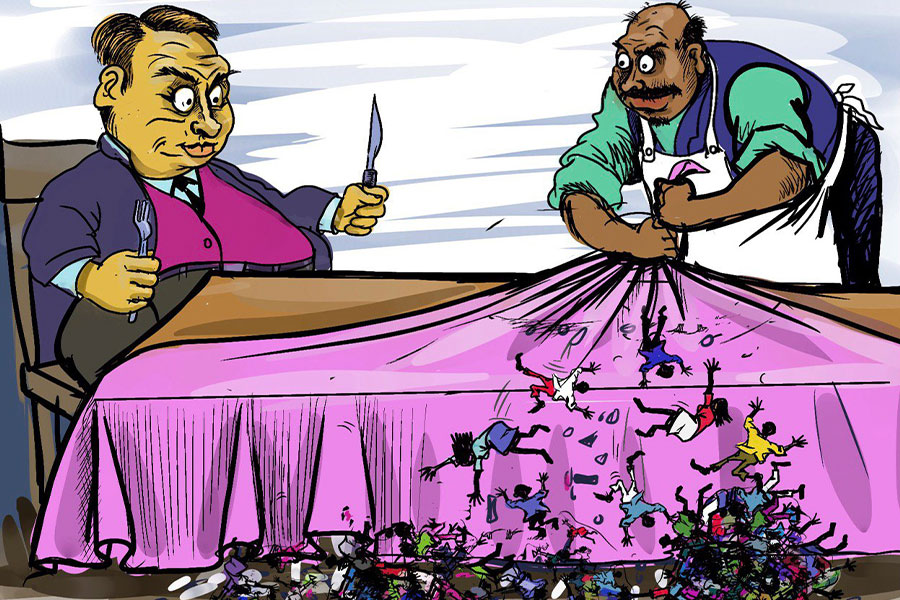
Radar | Feb 04,2023
May 23 , 2020
By Girma Mamo
The government’s attempt to ingratiate itself with foreign investors through incentives has led to outcries by local investors who claim that the resources could have gone to building their capacity. They have a point, writes Girma Mamo (girma1mamo@yahoo.com), who has experience in quality fields works in the manufacturing industry and development agencies.
The present global economic order is built on the exchange of goods and services between nations. Economies, to maintain their balance of trade at a healthy level, depend on the quality of products and services they bring to the international market. This demands having resilient industries that can compete with actors of other countries in the international market.
Developing countries, such as Ethiopia, are no different. To supplement their capabilities, such countries have turned to foreign investors that can bring in the resources and expertise necessary to build a competitive economy. For several years, Ethiopia’s government has been trying to capitalize on foreign direct investment (FDI). This has been an endeavour that continues to cost the nation billions of dollars in terms of infrastructure financing.
It is not only through infrastructure financing that the government is trying to attract investors. It has also put in place attractive incentive packages for investors that come from overseas. The incentive packages range from tax holidays to income tax holidays and from credit support to duty-free import of capital goods.
Despite this, over the past two years, FDI has been decreasing. This was not unexpected given the country's political volatility, which ate away at investor confidence. But it is also the case that, despite increases in aggregate foreign investment over the past decade, it has not translated into facilitating foreign currency generation or increasing domestic resource mobilisation.
The government’s attempt to ingratiate itself with foreign investors through incentives has also led to outcries by local investors who claim that the resources could have gone to building their capacity. They have a point in that local businesses have been squeezed through tax and bureaucratic red tape.
The record of FDI indeed leaves a lot to be desired. There is no need to look elsewhere here than the Development Bank of Ethiopia (DBE). At one point, just five foreign companies held 46pc of its total non-performing loans. This has led to the state bank haemorrhaging billions of Birr. Some of these loans are lost forever and are not expected to be recovered in any meaningful way.
The reason for this has been the lack of transparency, accountability and follow-up that surrounds FDI. The main factors for the DBE’s non-performing loans have been linked to poor due diligence assessment, non-credit worthy project financing and poor financial recording.
The main objectives of inviting foreign investors is to improve the living standards of the peoples of Ethiopia through the realisation of sustainable economic and social development. This is by increasing foreign exchange earnings through the export of quality products and services, savings of hard currency through import substitution, creating employment opportunities for Ethiopians and to advance the transfer of technology required for the development of the country.
But when these investors are treated like spoilt children with the key to unlocking Ethiopia’s economic catch-up, they could be doing more harm than good.
There is a double-standard in how the government has come to treat local businesses and foreign investors. It cannot close the shops of local traders for relatively small offences and chase off street vendors while at the same time being lax with big investors who are supposed to inject FDI into the economy but end up abusing the incentives that have been handed down to them.
Many developing nation’s experiences show that FDI plays a crucial role to economic development. It has also been the experience of many countries that multinational corporations, when they fail to be held accountable for their actions and are able to operate in the dark, have no problem exploiting resources. If Ethiopia fails to improve its regulatory enforcement, it will be an example of the latter.
We have to be very keen not to create a nation that has laws but also strong individuals and institutions above it as well.
PUBLISHED ON
May 23,2020 [ VOL
21 , NO
1047]


Radar | Sep 05,2022

Radar | Aug 18,2024

Fortune News | Oct 13,2024

Fortune News | Oct 30,2021

Editorial | May 31,2025

Photo Gallery | 176374 Views | May 06,2019

Photo Gallery | 166588 Views | Apr 26,2019

Photo Gallery | 157087 Views | Oct 06,2021

My Opinion | 136905 Views | Aug 14,2021

Dec 22 , 2024 . By TIZITA SHEWAFERAW
Charged with transforming colossal state-owned enterprises into modern and competitiv...

Aug 18 , 2024 . By AKSAH ITALO
Although predictable Yonas Zerihun's job in the ride-hailing service is not immune to...

Jul 28 , 2024 . By TIZITA SHEWAFERAW
Unhabitual, perhaps too many, Samuel Gebreyohannes, 38, used to occasionally enjoy a couple of beers at breakfast. However, he recently swit...

Jul 13 , 2024 . By AKSAH ITALO
Investors who rely on tractors, trucks, and field vehicles for commuting, transporting commodities, and f...

Oct 18 , 2025
The political establishment, notably the ruling party and its top brass, has become p...

Oct 11 , 2025
Ladislas Farago, a roving Associated Press (AP) correspondent, arrived in Ethiopia in...

Oct 4 , 2025
Eyob Tekalegn (PhD) had been in the Governor's chair for only weeks when, on Septembe...

Sep 27 , 2025
Four years into an experiment with “shock therapy” in education, the national moo...

Oct 18 , 2025 . By NAHOM AYELE
In a sweeping reform that upends nearly a decade of uniform health insurance contribu...

A bill that could transform the nutritional state sits in a limbo, even as the countr...

Oct 18 , 2025 . By SURAFEL MULUGETA
A long-planned directive to curb carbon emissions from fossil-fuel-powered vehicles h...

Oct 18 , 2025 . By BEZAWIT HULUAGER
Transaction advisors working with companies that hold over a quarter of a billion Bir...